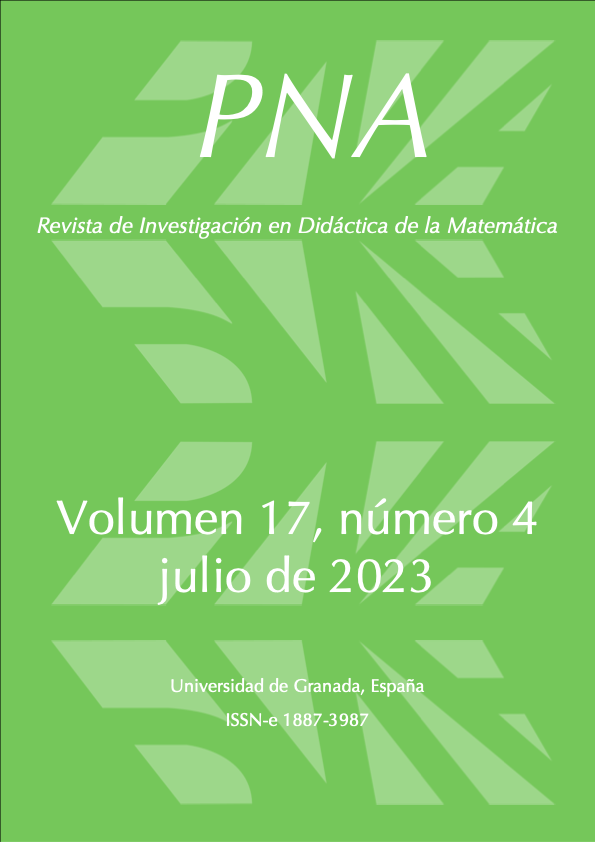Detección, provocación y superación de bloqueos de resolución de problemas matemáticos en magisterio
DOI:
https://doi.org/10.30827/pna.v17i3.24615Palabras clave:
Bloqueos, Competencia Matemática, Creatividad, Enseñanza de las Matemáticas, Formación de profesorado, Resolución de problemasResumen
Este estudio explora bloqueos emergentes al resolver problemas, cómo suscitarlos y superarlos con 53 alumnos de Didáctica de Geometría en Primaria. Para ello se diseñan cuestionarios y tareas, y se proponen lecturas de expertos, discusiones grupales y resolución y creación de problemas. Se toman tres orígenes de bloqueos: afectivo, cognoscitivo, cultural y ambiental. Se concluye que identificar propios bloqueos resolviendo problemas no implica saber provocarlos, que ser competente creando problemas y tener un listado de bloqueos no garantiza saber provocarlos, que estudiar cómo superar bloqueos no basta para ayudar a superarlos y que detectar bloqueos y superarlos no implica la resolución correcta.
Descargas
Citas
Arora, R., Arora, P. y Chadha, B. (2020). Problem Solving and Reasoning ability in Mathematics of Senior Secondary School Students in Relation to Emotional intelligence. A Journal of Composition Theory, 13(2), 938-948.
Attami, D., Budiyono, B. y Indriati, D. (2020). The mathematical problem-solving ability of junior high school students based on their mathematical resilience. Journal of Physics: Conference Series, 1469. https://doi.org/10.1088/1742-6596/1469/1/012152 DOI: https://doi.org/10.1088/1742-6596/1469/1/012152
Beltrán, C., Guerrero, F. y Ramírez, O. (2009). La superación del ¡atascado! desde la heurística: un estudio en una comunidad de estudiantes para profesor de matemáticas. En García, O. (Ed), Memorias del 10 Encuentro Colombiano de Matemática Educativa. Hilbert Blanco. http://asocolme.org/index.php/eventos/anteriores/ecme-13/conferencistas-y-cursillistas/43-publicaciones-asocolme/memorias-ecme
Cai, J. y Hwang, S. (2020). Learning to teach through mathematical problem posing: Theoretical considerations, methodology, and directions for future research. International Journal of Educational Research, 102, 101391. https://doi.org/10.1016/j.ijer.2019.01.001 DOI: https://doi.org/10.1016/j.ijer.2019.01.001
Cai, J., Chen, T., Li, X., Xu, R., Zhang, S., Hu, Y. y Song, N. (2020). Exploring the impact of a problem-posing workshop on elementary school mathematics teachers’ conceptions on problem posing and lesson design. International Journal of Educational Research, 102, 1-12. https://doi.org/10.1016/j.ijer.2019.02.004 DOI: https://doi.org/10.1016/j.ijer.2019.02.004
Chávez, C. F. y Rojas, O. (2021). Algunas consideraciones sobre el pensamiento divergente y la creatividad a partir de la resolución de un problema geométrico con múltiples vías de solución. Números. Revista de Didáctica de las Matemáticas, 107, 91-108.
Díaz, J.A. y Díaz, R. (2018). Los métodos de resolución de problemas y el desarrollo del pensamiento matemático. Bolema, 32(60), 57-74. https://doi.org/10.1590/1980-4415v32n60a03 DOI: https://doi.org/10.1590/1980-4415v32n60a03
Gómez-Chacón, I. M. (2002). Afecto y aprendizaje matemático: causas y consecuencias de la interacción emocional. En J. Carrillo (Ed.), Reflexiones sobre el pasado, presente y futuro de las Matemáticas (pp. 197-227). Universidad de Huelva.
Guzmán, M. (1991). Para pensar mejor. Labor.
Haavold, P., Hwa Lee, K. y Sriraman, B. (2018). Creativity in Mathematics Education. En S. Lerman (Ed.), Encyclopedia of Mathematics Education (pp. 1-10). Springer. https://doi.org/10.1007/978-3-319-77487-9_33-7 DOI: https://doi.org/10.1007/978-3-319-77487-9_33-7
Liljedahl, P. (2013). Illumination: An affective experience? The International Journal on Mathematics Education, 45(2), 253-265. https://doi.org/10.1007/s11858-012-0473-3 DOI: https://doi.org/10.1007/s11858-012-0473-3
Mallart, A., Font, V. y Malaspina, U. (2016). Reflexión sobre el significado de qué es un buen problema en la formación inicial de maestros. Perfiles Educativos, 38(152), 14-30. https://doi.org/10.22201/iisue.24486167e.2016.152.57585 DOI: https://doi.org/10.22201/iisue.24486167e.2016.152.57585
Mason, J., Burton, L. y Stacey, K. (1989). Pensar Matemáticamente. Labor.
Mehta, R. y Dahl, D. W. (2019). Creativity: Past, present, and future. Consumer Psychol Review, 2(1), 30-49. https://doi.org/10.1002/arcp.1044 DOI: https://doi.org/10.1002/arcp.1044
Niss, M. y Højgaard, T. (2019). Mathematical competencies revisited. Educational Studies in Mathematics, 102(1), 9-28. https://doi.org/10.1007/s10649-019-09903-9 DOI: https://doi.org/10.1007/s10649-019-09903-9
Özdemir, D. A. y Işiksal, M. (2019). Mathematically gifted students’ differentiated needs: what kind of support do they need? International Journal of Mathematical Education in Science and Technology, 1-19. https://doi.org/10.1080/0020739X.2019.1658817 DOI: https://doi.org/10.1080/0020739X.2019.1658817
Polya, G. (1945). How to solve it. Princeton University Press. DOI: https://doi.org/10.1515/9781400828678
Loría, J.R. y Lupiáñez, J.L. (2019). Estudio del conocimiento de profesores de secundaria sobre procesos matemáticos. PNA, 13(4), 247-269. https://doi.org/10.30827/pna.v13i4.8892 DOI: https://doi.org/10.30827/pna.v13i4.8892
Sánchez, F. y Fiol, M. (2016). Creatividad matemática: Momentos de insight en estudiantes de 4º de ESO. Journal of Research in Mathematics Education, 5(1), 28-55. https://doi.org/10.17583/redimat.2016.1809 DOI: https://doi.org/10.17583/redimat.2016.1809
Sengül, S. y Katranci, Y. (2015). Free problem posing cases of prospective mathematics teachers: Difficulties and solutions. Procedia-Social and Behavioral Sciences, 174, 1983-1990. https://doi.org/10.1016/j.sbspro.2015.01.864 DOI: https://doi.org/10.1016/j.sbspro.2015.01.864
Villalonga, J. y Deulofeu, J. (2017). La base de orientación en la resolución de problemas: “Cuando me bloqueo o me equivoco.” REDIMAT, 6(3), 256-282. https://doi.org/10.17583/redimat.2017.2262 DOI: https://doi.org/10.17583/redimat.2017.2262
Wertheimer, M. (1959). Productive thinking. Harper and Brothers.
Descargas
Publicado
Número
Sección
Licencia
Derechos de autor 2023 PNA. Revista de Investigación en Didáctica de la Matemática

Esta obra está bajo una licencia internacional Creative Commons Atribución-NoComercial-SinDerivadas 4.0.



















